情态动词
什么是情态动词
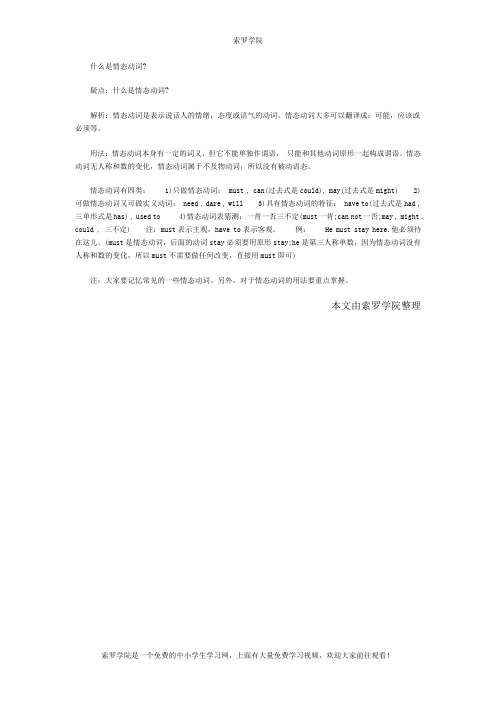
索罗学院
什么是情态动词?
疑点:什么是情态动词?
解析:情态动词是表示说话人的情绪,态度或语气的动词。
情态动词大多可以翻译成:可能,应该或
必须等。
用法:情态动词本身有一定的词义,但它不能单独作谓语,只能和其他动词原形一起构成谓语。
情态动词无人称和数的变化,情态动词属于不及物动词,所以没有被动语态。
情态动词有四类:1)只做情态动词: must , can(过去式是could), may(过去式是might) 2)可做情态动词又可做实义动词: need , dare , will 3)具有情态动词的特征: have to(过去式是had , 三单形式是has) , used to 4)情态动词表猜测:一肯一否三不定(must一肯;can not一否;may , might , could , 三不定) 注:must表示主观,have to表示客观。
例:He must stay here.他必须待在这儿。
(must是情态动词,后面的动词stay必须要用原形stay;he是第三人称单数,因为情态动词没有人称和数的变化,所以must不需要做任何改变,直接用must即可)
注:大家要记忆常见的一些情态动词。
另外,对于情态动词的用法要重点掌握。
本文由索罗学院整理索罗学院是一个免费的中小学生学习网,上面有大量免费学习视频,欢迎大家前往观看!。
常见的5个情态动词
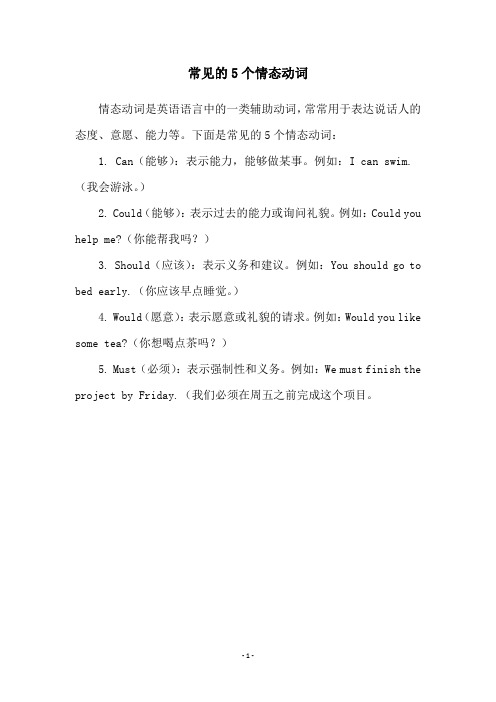
常见的5个情态动词
情态动词是英语语言中的一类辅助动词,常常用于表达说话人的态度、意愿、能力等。
下面是常见的5个情态动词:
1. Can(能够):表示能力,能够做某事。
例如:I can swim.(我会游泳。
)
2. Could(能够):表示过去的能力或询问礼貌。
例如:Could you help me?(你能帮我吗?)
3. Should(应该):表示义务和建议。
例如:You should go to bed early.(你应该早点睡觉。
)
4. Would(愿意):表示愿意或礼貌的请求。
例如:Would you like some tea?(你想喝点茶吗?)
5. Must(必须):表示强制性和义务。
例如:We must finish the project by Friday.(我们必须在周五之前完成这个项目。
- 1 -。
情态动词

2) 用来代替may, 谈现在的情况,口气比may更婉转些: A. 表示“可以”(用may时更多一些) Might (may) I have a little brandy? Might I use your phone? B.表示“可能”,“或许” He might tell his wife. She might not believe your story. 3)用于虚拟条件句: If I had known the film was about China, I might have gone to see it. 要是知道这影片是有关于中国的,我可能就去看了 If you invited him, he might come. 如果你邀请他,他可能会来 If you didn’t mind, we might go there. 如果你要晚到,你可以告诉我一声
情态动词
含义和特征
情态动词只有情态意义,即它表示的是说话人对 动作的观点,如需要、可能、意愿或怀疑等。情 态动词具有以下特征: 1)在形式上,情态动词没有实义动词的各种变化, 只有could、would、had to、was(were) to 、 might等几个过去式,其他的如 must、 ought to 等的过去式与现在式同形。 2) 在意义上,大多数情态动词有多个意义。如 can 可表示可能、能够、允许等,may可表示可 能、允许、目的、让步等。 3)在用法上,情态动词与助动词一样,后面须 接动词原形,构成谓语动词。
might的用法
might 主要由以下用法: 1) 用作may的过去式 A. 表示“可以” I asked if I might go home half an hour earlier today. 我问我是否可以提早半小时回家 He asked if he might use the phone. 他问是否可以用一下电话 B.表示“可能”(或许会) He said he might be late. I guessed he might come tomorrow. C. 用在某些状语从句: I did this so that I might have time to prepare my paper. 我这样做以便我有时间把稿子准备好 Try as she might, she could not persuade her friends to go. 不管她这样想办法,都不能说动她的朋友们去
情态动词
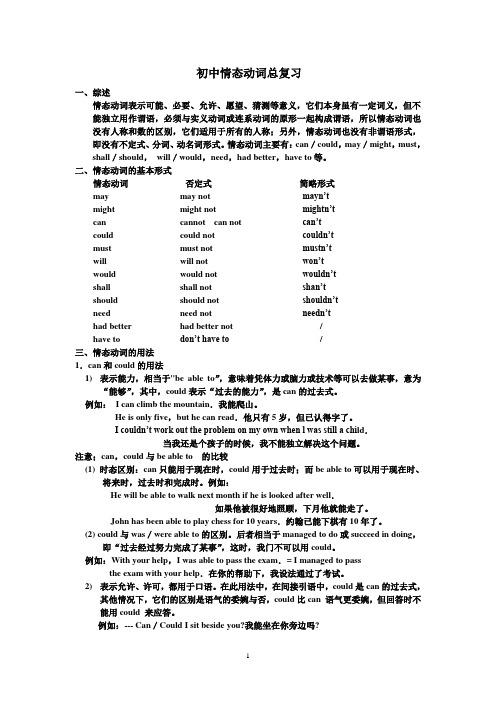
初中情态动词总复习一、综述情态动词表示可能、必要、允许、愿望、猜测等意义,它们本身虽有一定词义,但不能独立用作谓语,必须与实义动词或连系动词的原形一起构成谓语,所以情态动词也没有人称和数的区别,它们适用于所有的人称;另外,情态动词也没有非谓语形式,即没有不定式、分词、动名词形式。
情态动词主要有:can/could,may/might,must,shall/should,will/would,need,had better,have to等。
二、情态动词的基本形式情态动词否定式简略形式may may not mayn’tmight might not mightn’tcan cannot can not can’tcould could not couldn’tmust must not mustn’twill will not won’twould would not wouldn’tshall shall not shan’tshould should not shouldn’tneed need not needn’thad better h ad better not /have to don’t have to /三、情态动词的用法1.can和could的用法1)表示能力,相当于"be able to”,意味着凭体力或脑力或技术等可以去做某事,意为“能够”,其中,could表示“过去的能力”,是can的过去式。
例如:I can climb the mountain.我能爬山。
He is only five,but he can read.他只有5岁,但已认得字了。
I couldn’t work out the problem on my own when l was still a chi ld.当我还是个孩子的时候,我不能独立解决这个问题。
注意;can,could与be able to 的比较(1) 时态区别:can只能用于现在时,could用于过去时;而be able to可以用于现在时、将来时,过去时和完成时。
情态动词详解
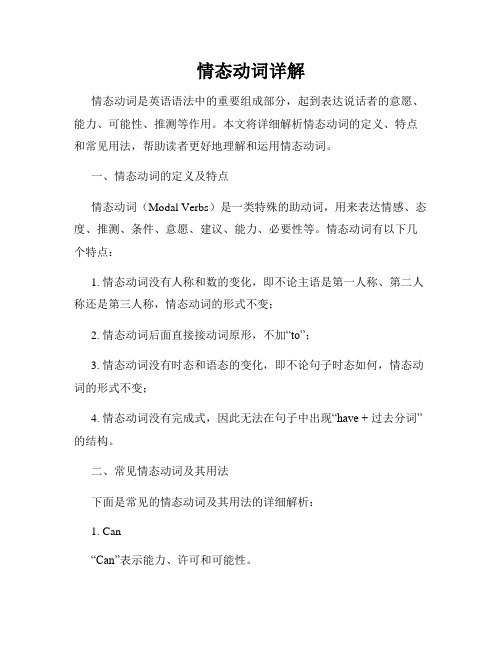
情态动词详解情态动词是英语语法中的重要组成部分,起到表达说话者的意愿、能力、可能性、推测等作用。
本文将详细解析情态动词的定义、特点和常见用法,帮助读者更好地理解和运用情态动词。
一、情态动词的定义及特点情态动词(Modal Verbs)是一类特殊的助动词,用来表达情感、态度、推测、条件、意愿、建议、能力、必要性等。
情态动词有以下几个特点:1. 情态动词没有人称和数的变化,即不论主语是第一人称、第二人称还是第三人称,情态动词的形式不变;2. 情态动词后面直接接动词原形,不加“to”;3. 情态动词没有时态和语态的变化,即不论句子时态如何,情态动词的形式不变;4. 情态动词没有完成式,因此无法在句子中出现“have + 过去分词”的结构。
二、常见情态动词及其用法下面是常见的情态动词及其用法的详细解析:1. Can“Can”表示能力、许可和可能性。
能力:用于表达某人在某方面具有的能力或技能。
例句:He can speak three languages.许可:用于征求或给予许可。
例句:Can I borrow your pen, please?可能性:用于表达可能发生的情况。
例句:It can rain tomorrow.2. Could“Could”是Can的过去式,表示过去或虚拟条件下的能力、许可和可能性。
能力(过去):用于表达过去具备的能力或技能。
例句:When I was young, I could run very fast.许可(过去):用于过去征求或给予许可。
例句:Could I use your phone yesterday?可能性(虚拟条件):用于表示虚拟情况下的可能性。
例句:If I had enough money, I could travel around the world.3. May“May”表示允许、可能性、祝愿和推测。
允许:用于征求或给予许可。
例句:May I come in?可能性:用于表达主观推测的可能性。
中文情态动词
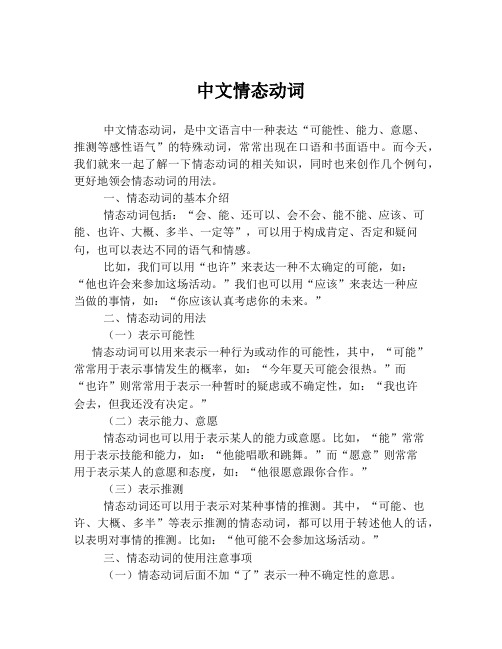
中文情态动词中文情态动词,是中文语言中一种表达“可能性、能力、意愿、推测等感性语气”的特殊动词,常常出现在口语和书面语中。
而今天,我们就来一起了解一下情态动词的相关知识,同时也来创作几个例句,更好地领会情态动词的用法。
一、情态动词的基本介绍情态动词包括:“会、能、还可以、会不会、能不能、应该、可能、也许、大概、多半、一定等”,可以用于构成肯定、否定和疑问句,也可以表达不同的语气和情感。
比如,我们可以用“也许”来表达一种不太确定的可能,如:“他也许会来参加这场活动。
”我们也可以用“应该”来表达一种应当做的事情,如:“你应该认真考虑你的未来。
”二、情态动词的用法(一)表示可能性情态动词可以用来表示一种行为或动作的可能性,其中,“可能”常常用于表示事情发生的概率,如:“今年夏天可能会很热。
”而“也许”则常常用于表示一种暂时的疑虑或不确定性,如:“我也许会去,但我还没有决定。
”(二)表示能力、意愿情态动词也可以用于表示某人的能力或意愿。
比如,“能”常常用于表示技能和能力,如:“他能唱歌和跳舞。
”而“愿意”则常常用于表示某人的意愿和态度,如:“他很愿意跟你合作。
”(三)表示推测情态动词还可以用于表示对某种事情的推测。
其中,“可能、也许、大概、多半”等表示推测的情态动词,都可以用于转述他人的话,以表明对事情的推测。
比如:“他可能不会参加这场活动。
”三、情态动词的使用注意事项(一)情态动词后面不加“了”表示一种不确定性的意思。
(二)情态动词表示的是一种语气或态度,因此语境和语气的不同会导致情态动词的意义产生变化。
(三)情态动词不能单独使用,需要和实义动词结合使用。
举个例子,“我能打篮球。
”中的“能”表示能力,可是这个句子如果单独使用,则就成为一个空洞的句子,没有完整的语义。
四、情态动词的例句1、他会唱歌,跳舞和演讲,是一个全才。
(表达技能和能力)2、我应该已经赶上去了。
(表达可能性)3、我也许会去,但我不能确定。
情态动词

School is over. You can go home now. He said I could borrow his bike . We shall be able to finish the work next week.
(6).否定形式 can not could not
2. 表示否定的情态动词的用法。
3. shall 和 will 的多种意义的区别。
4. 情态动词短语的使用。 5. 虚拟语气中情态动词的使用。
5. — Could I borrow your dictionary?
C — Yes, of course you _______.
A. might
B. will
(5).一般疑问句及回答:
--Must I…? --Yes, you must. --No, you needn’t ∕don’t have to.(不,你不必).
e.y:--Must we go to school on time tomorrow? --Yes, you must. --No, you needn’t.
C 1、Can you play ____piano? A、a B、an C、the B 2、Can you dance? yes, I ____. A、do B、can C、 can’t B 3、Can he Write English? No,he ____ A、can B、 can’t C、does C ride a bike ,but I ____drive a car. 4、I __ A、can , can B、 can’t , can’t C、can, can’t A 5、She can _____basketball . A、play B、playing
情态动词

6. will, would a). 用于疑问句表示说话人向对方提出请求或询问 用 用于疑问句表示说话人向对方提出请求或询问,用 would 比 will 更婉转 客气。用于第二人称。 更婉转,客气 用于第二人称。 客气。 It’s hot. Will you open the windows? Will you help me to work it out? Would you like some coffee? ? b). will (would)决心 愿望。 would 为 will 的过去式 可用于各人称。 决心,愿望 的过去式,可用于各人称 可用于各人称。 决心 愿望。 I will never do that again.
情态动词
定义: 情态动词是一种本身有一定的词义,表示说话人的情绪 表示说话人的情绪,态 定义 情态动词是一种本身有一定的词义 表示说话人的情绪 态 度或语气的动词,但不能单独作谓语 但不能单独作谓语, 度或语气的动词 但不能单独作谓语 只能和其他动词原形构成 谓语。 谓语。
二、情态动词分类 表示能力: 表示能力:can / be able to 表示许可: 表示许可:can / may 表示必须: 表示必须:must / have to / ought to / should 表示虚拟: 表示虚拟:should/ could /would 表示推测: 表示推测:must / should / ought to /can / may 其它: 其它:dare / shall / will / need
4. Why / How + should 表示说话人对某事不理解, 表示说话人对某事不理解, 感到意外,惊异. 感到意外,惊异 Why should he tell a lie? -----Where is Betty living? -----How should I know?
- 1、下载文档前请自行甄别文档内容的完整性,平台不提供额外的编辑、内容补充、找答案等附加服务。
- 2、"仅部分预览"的文档,不可在线预览部分如存在完整性等问题,可反馈申请退款(可完整预览的文档不适用该条件!)。
- 3、如文档侵犯您的权益,请联系客服反馈,我们会尽快为您处理(人工客服工作时间:9:00-18:30)。
情态动词和虚拟语气(一)情态动词modal verbs (mood)(1) Will, would, shall, should, can, could, may, might, must, ought to (should)(2) need, dare, be able to , have to ,ought to , had better ( semi-modal verbs 半情态动词)will(1) Will you please sit down?(2) I will have nothing to do this matter.(3) I will not let my parents down.(4) Roses will blossom in June.(5) Boys will be boys.(6) No one will leave the examination room before 12 o’clock.Would(1)He knew he would be late.(2)When he was young he would walk in these woods.(3) Would you kindly sent me address?(4)The person you mentioned would be her father.(5) She would be stupid not to accept.(6)If I were a man, I would take the challenge. (Subjunctive Mood 虚拟语气)(7)If I had seen the advertisement, I would have applied for the job.(Subjunctive Mood 虚拟语气)(8) She worried for fear that her child would be hurt.(9) I would be only to glad to help. I’d love a coffee. I’d prefer to go by plan. I would rather have the blue. I would sooner go home.ShallI shall go to school next Monday.What time shall I come?In the rules, it says that a player shall be sent off for using bad language.Should(1) The police should do something to fight against the terrorists.(2) She advised that we should keep the gate locked. ( agree, arrange, ask, command, determine, order, advocate, propose, stipulate, suggest)It advisable that everyone should have map.It is better that he should hear from you.It is essential that he should be prepared for this.It is only right that she should have a share.It is his suggestions that I should be come round to see you.(3)I find it quite astonishing that he should be so rude to you.I can’t think why she should have done such disgusting deeds.(4)He wore a mask so that on one should recognize him.( in case, lest)(5)He should have arrived by now.(6) You shouldn’t have trusted him so easily. (Subjunctive Mood 虚拟语气)If he had asked me, I should(would) have helped her.CanCan you help me with the box?Scotland can be very cold. (有时候)This can’t be Mary- she is in hospital. (推测,否定)She can’t be telling the truth.You can’t smoke here.CouldHe said he couldn’t come.Could you show me the way?Could you have been waiting so long?You could get into university if you applied.I could have earned lots of money if I had worked hard. (Subjunctive Mood 虚拟语气)I could have died laughing. (Subjunctive Mood 虚拟语气)You could have told me beforehand.(Subjunctive Mood 虚拟语气)MayMay I come in?You may come if you wish.Jim may know Tom’s telephone number.He may have immigrated abroad.May you be happy.May God be with you.MightHe said he might be late.She might not believe your story.We might be going to Spain on holiday this year.If you invited him, he might come. (Subjunctive Mood 虚拟语气)The pills might have helped him, if he had taken them regularly. (Subjunctive Mood 虚拟语气)MustYou must cut down smoking.You mustn’t drive without license.You must be hungry.It must have rained last night for the floor is still wet.They might be twins.They may be twins.They can be twins.They must be twins.They can’t be twins semi-modal verbs 半情态动词need, dare, be able to (can), have to (must), had betterneedYou needn’t finish your graduation paper in time.All living things needs water. ( Transitive Verb)I need to get some sleep.Dare(1) I dare not ask her to marry me.(2) No one dare speak of it.(3) How dare you speak to me like that?(1) He dares to accuse me of dishonesty.----He doesn’t dare to accuse me of dishonesty.(2) He will dare any danger.(3) Can you jump off the war? Go on, I dare you.(二)虚拟语气1)现在虚拟语气God bless you.God be praised.It is essential that the ban should be lifted.She petitioned the king that her father should be pardoned.2)过去虚拟语气she treated me as though I were a slave.If only I were not so nervous.3)过去完成时I wished I hadn’t said such merciless words to her.If only I have listened to your advice.虚拟语气在条件句中的用法虚拟条件句(Sentences of Unreal Conditions)(1)If had a map, I would (could, might) lend it you.(2)He were(was) to resign, who would take his place.(3)If I were Tom, I would refuse.(4)Were I Tom, I would refuse.(5)If it were not for your help, we would be in serious trouble.(6)Were it not for you help, we would be in serious trouble.(7)I would(could, might, should ) have got the job, if I had applied in time.(8)If you had taken her advice, you would not be in such trouble now. ( 错综时间条件句Conditional Sentences of Mixed time)(9)I would have written her a letter before but I have been ill. (含蓄条件句Sentences of Implied Condition)虚拟语气在某些从句中的运用(1)I wish I knew what was going to happen.I wish I could help you.I wish I had not lied to her.(2)I would rather you told me the truth.I would rather you had not told me the truth.I had rather you did it.(3)suggest, demand, insist, ask, advise, urge, propose, vote, request, desire, order, intend, petition, decreed, orderIt was proposed that this matter be discussed at the next meeting.(4)It is important that he work hard. ( essential, appropriate, imperative, vital)(5)It is surprising that you should be rude.(6)I have loved you as if you were my son. ( as if ,as though, though)Whether she be right or wrong, we will support her.(7)It is time we went.It is time we were leaving.It is high time you brought a new car.It is high time you made up your mind.(8)oh, that the rain would stop.That he should act so rudely toward you!(9)He is , as it were, a walking dictionary.He is my best friend, my second self as it were.(10)Who would have thought to see you here.测试(1)1. “You ______ borrow my notes provided you take care of them,” I told my friend.A. couldB. shouldC. mustD. can2. She _____fifty or so when I first met her at the conference.A. must beB. had beenC. could beD. must have been4. I am surprised__ this city is a dull place to live in.A that you should thinkB by what you are thinkingC that you would thinkD with what you were thinking5. Nancy's gone to work but her car's still there. She ____ by bus.A. must have goneB. should have goC. ought to have goneD. could have gone6. Which of the following sentences is a COMMAND?A. Beg your pardon.B. Have a good time.C. Never do that again!D. What noise you are making!7. The sentence that expresses OFFER is _____.A. I'll get some drinks. What will you have?B. Does she need to book a ticket now?C. May I know your name?D. Can you return the book next week?8.Which of the following sentences expresses WILLINGNESS?A.By now she will be eating dinner.B.I shall never do that again.C.My brother will help you with the luggage.D.You shall get a promotion.9.Which of the following best explains the meaning of“Shall we buy the tickets first”?A.He said that we were going to buy the tickets first.B.He requested that we buy the tickets first.C.He suggested that we buy the tickets first.D.He advised us to buy the tickets first.10. Which of the following is NOT an imperative sentence?A. Let me drive you home, shall I?B. You will mind your own business!C. Come and have dinner with us.D. I wish you could stay behind.11. Which of the following sentences expresses a fact?A. Mary and her son must be home by now.B. Careless reading must give poor results.C. It’s getting late, and I must leave now.D. He must be working late at the office.12. Which of the following sentences indicates POSSIBILITY?A. The moon cannot always be at the full.B. You cannot smoke inside the building.C. He cannot come today.D. She cannot play the piano.13.When the sentence “Shall I drive you to the airport first?” is turned into indirect speech, which of the following is most appropriate?A. He agreed to drive me to the airport first.B. He offered to drive me to the airport first.C. He advised me to go to the airport first.D. He suggested that I drive to the airport first.14. Loudspeakers were fixed in the hall so that everyone__ an opportunity to hear the speech.A ought to haveB must haveC may haveD should have测试(2)1. He suggested _______ to tomorrow’s exhibition together.A.us to go B.we went C.we shall go D.we go2. It is highly desirable that a new president _______ for this college.A.appointed B.be appointed C.is appointed D.has been appointed4. It was essential that all the necessary documents _______ to the president's office being the end of this month.A.be handed in B.must be handed in C.Should D.had been handed in3. It was proposed that the matter _______ discussed at the next meeting.A.will be B.has C.be D.would be4. We desire that the tour leader _______us immediately of any change in plans.A.inform B.informs C.informed D.has informed5. The manager of the hotel requests that their guests _______ after 11:00 pm.A.not to play loud music B.shouldn’t' t play loud musicC.don't play loud music D.couldn't play loud music6. It is recommended that the project _______ until all the preparations have been made.A.is not started B.will not be started C.not be started D.is not to be started7. It is politely requested by the hotel management that radios _______ after 11 o'clock at night.A.were not played B.not to play C.not be played D.did not play8. I don't think it advisable that Tom _______ to the job since he has no experience.A.is assigned B.will be assigned C.be assigned D.has been assigned9.We are all for your proposal that the discussion_______.A.be put off B.was put off C.should put off D.is to put off10. Many a delegate was in favor of his proposal that a special committee _______ to investigate the incident. A.were set up B.was set up C.be set up D.set up11. If the earth suddenly _______ spinning, we would all fly off it.A.had stopped B.stopped C.has stopped D.would stop12. I'm sorry Andy didn't want to go to the conference, _______ willing to go we would have paid all his expenses. A.being B.was he C.he had been D.had he been13. Jean doesn't want to work right away because she thinks that if she _______ a job she probably wouldn't be able to see her friends very often.A.has to get B.were to get C.had got D.could have got14. _______ right now, she would get there on Sunday.A.Would she leave B.If she leaves C.Were she to leave D.If she had left15. If the whole operation _______ beforehand, a great deal of time and money would have been lost.A.was not planned B.has not been planned C.had not been planned D.were not planned16. The millions of calculations involved, had they been done by hand, all practical value _______ by the time they were finished.A.had lost B.would have lost C.would lose D.should have lost17. _______ before we depart the day after tomorrow, we should have a wonderful dinner party.A.Had they arrived B.Would they arriveC.Were they arriving D.Were they to arrive18. Had he worked harder, he _______ the exams.A.must have got through B.would have got throughC.would get through D.could get through19. _______ for your laziness, you could have finished the assignment by now.A.Had it not been B.It were not C.Weren't it D.Had not it been20._______ for my illness I would have lent him a helping hand.A.Not being B.Had it not been C.Without being D.Not having been21. _______ the help of their group, we would not have succeeded in the investigation.A.Besides B.Regardless of C.But for D.Despite22. _______ the storm, the ship would have reached its destination on time.A.But for B. In case of C.In spite of D.Because of23. The picture exhibition bored me to death. I wish I _______ to it.A.have not gone B.did not go C.had not gone D.should not have gone24. I wish I _______ longer this morning, but I had to get up and come to class.A.could have slept B.slept C.might have slept D.have slept25. Which of the following sentences contains subjunctive mood?A. Lucy insisted that her son get home before 5 o’clock?B. She used to drive to work, but now she takes the city metro.C. Walk straight ahead, and don’t turn till the second traffic lights.D. Paul will cancel his flight if he cannot get his visa by Friday.26. If it _______ tomorrow, the match would be put off.A. were to rainB. was to rainC. was rainingD. had rained27.My boss ordered that the legal documents ____ to him before lunch.A.be sent B.were sent C.were to be sent D.must be sent28. It's getting late. I'd rather you _____ now.A. leftB. LeaveC. are leavingD. will leave29.____ if I had arrived yesterday without letting you know beforehand?A. Would you be surprisedB. Were you surprisedC. Had you been surprisedD. Would you have been surprised30.If not ____ with the respect he feels due to him, Jack gets very ill-tempered and grumbles all the time.A. being treatedB. TreatedC. be treatedD. having been treated31.It is imperative that students ____ their term papers on time.A. hand inB. would hand inC. have to hand inD. handed in32. If you explained the situation to your solicitor, he ________ able to advise you much better than I can.A. would beB. will have beenC. wasD. were33. That was not the first time he ________ us. I think it’s high time we ________ strong actions against him.A. betrayed…takeB. had betrayed…tookC. has betrayed…tookD. has betrayed…take34. ________ you _______ further problems with your printer, contact your dealer for advice.A. If, hadB. Have, hadC. Should, haveD. In case, have35. If only I __play the guitar as well as you!A wouldB couldC shouldD might36 It's high time we __ cutting down the rainforests.A stoppedB had to stopC shall stopD stop37 It is imperative that the government __ more investment into the shipbuilding industry.A attractsB shall attractC attractD has to38.If only the patient ______a different treatment instead of using the antibiotics, he might still be alive now.A. had receivedB. receivedC. should receiveD. were receiving39. If there were no subjunctive mood, English _____ much easier to learn.A. could have beenB. would beC. will beD. would have been40.My boss ordered that the legal documents ____ to him before lunch.A.be sent B.were sent C.were to be sent D.must be sent41. If it _______ tomorrow, the match would be put off.A. were to rainB. was to rainC. was rainingD. had rained42. It's getting late. I'd rather you _____ now.A. leftB. leaveC. are leavingD. will leaveD. You must complete the reading assignment on time.43. Aren't you tired? I ____ you had done enough for today.A. should have thoughtB. must have thoughtC. might have thoughtD. could have thought44. It is necessary that he ____ the assignment without delay.A. hand inB. hands inC. must hand inD. has to hand in45.He would have finished his college education, but he _______to quit and find a job to support his family.A. had hadB. hasC. hadD. would have。
